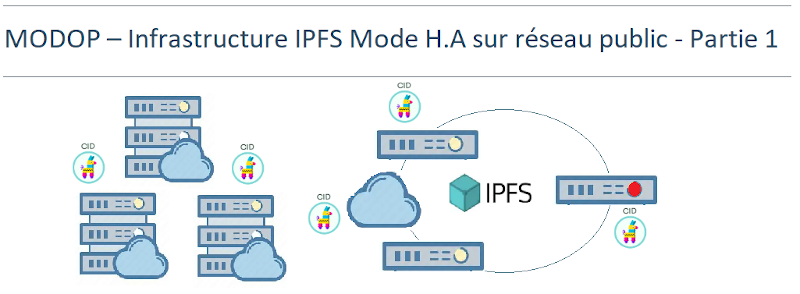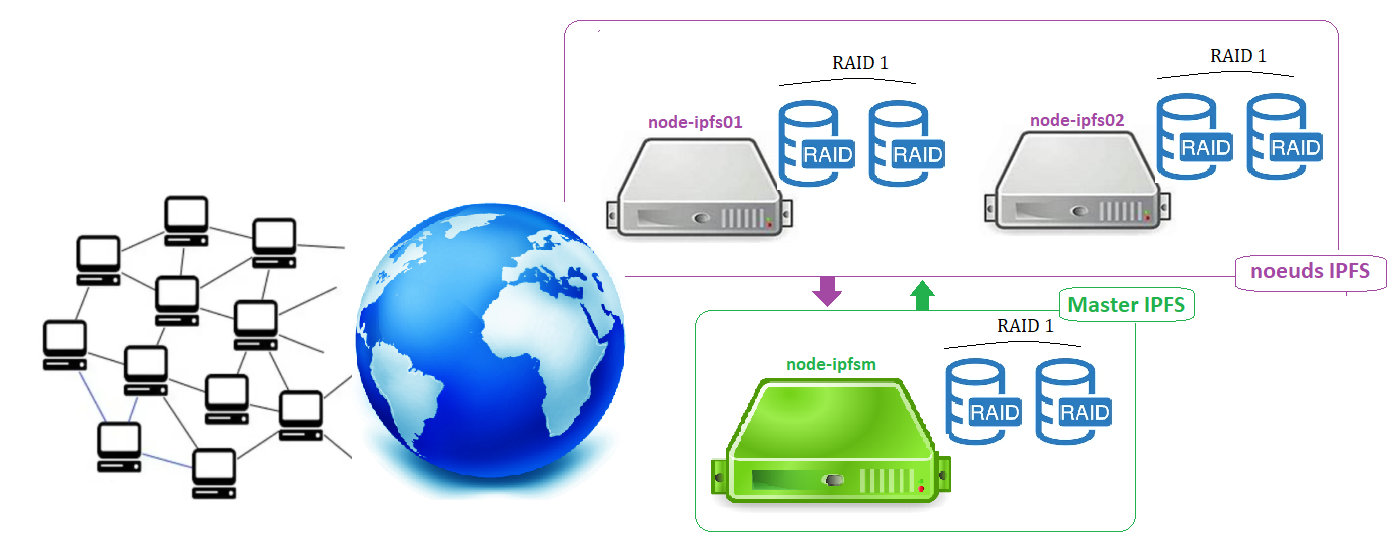
1. Inventaire du Cluster
Hostname
- Node-ipfsl : IP = 192.168.1.70 (leader)
- Node-ipfsp1 : IP = 192.168.1.71 (peer n°1)
- Node-ipfsp2 : IP = 192.168.1.72 (peer n°2)
HDD
- Disque SCSI0 : Système
- Disque SCSI1 & SCSI2 : RAID1
2. Installation des prérequis (3 nœuds)
Update machine
[root@node-ipfsx ~]# dnf -y update
Desactiver SELinux
[root@node-ipfsx ~]# setenforce 0 [root@node-ipfsx ~]# sed -i 's/SELINUX=enforcing/SELINUX=disabled/g' /etc/selinux/config [root@node-ipfsx ~]# getenforce Permissive
Paramétrage ntp
[root@node-ipfsx ~]# timedatectl set-timezone Europe/Paris [root@node-ipfsx ~]# timedatectl

Installation paquets utils
[root@node-ipfsx ~]# dnf install epel-release net-tools nmap wget tar -y
3. Configuration RAID1 (3 nœuds)
Inventaire des disques
[root@node-ipfsx ~]# lsblk

Installation du paquet RAID Logiciel
[root@node-ipfsx ~]# yum -y install mdadm
Chargement des modules RAID
[root@node-ipfsx ~]# modprobe linear [root@node-ipfsx ~]# modprobe raid1 [root@node-ipfsx ~]# cat /proc/mdstat

Chargement des modules RAID (On Boot)
[root@node-ipfsx ~]# echo "modprobe linear" >> /etc/rc.local [root@node-ipfsx ~]# echo "modprobe raid1" >> /etc/rc.local [root@node-ipfsx ~]# chmod +x /etc/rc.local
Examen des volumes disques
[root@node-ipfsx ~]# mdadm -E /dev/sd[b-c] mdadm: No md superblock detected on /dev/sdb. mdadm: No md superblock detected on /dev/sdc.
Partitionnement des disques en mode RAID
Disque /dev/sdb
[root@node-ipfsx ~]# parted -s /dev/sdb mklabel msdos [root@node-ipfsx ~]# parted -s /dev/sdb mkpart primary 1MiB 100% [root@node-ipfsx ~]# parted -s /dev/sdb set 1 raid on
Disque /dev/sdc
[root@node-ipfsx ~]# parted -s /dev/sdc mklabel msdos [root@node-ipfsx ~]# parted -s /dev/sdc mkpart primary 1MiB 100% [root@node-ipfsx ~]# parted -s /dev/sdc set 1 raid on [root@node-ipfsx ~]# fdisk -l /dev/sd[b-c] |grep RAID

Création du RAID 1
Inventaire des deux disques
[root@node-ipfsx ~]# mdadm -E /dev/sd[b-c]

Création RAID
[root@node-ipfsx ~]# mdadm --create /dev/md0 --level=1 --raid-devices=2 /dev/sdb1 /dev/sdc1

[root@node-ipfsx ~]# watch -n1 cat /proc/mdstat



Inventaire des disques RAID
[root@node-ipfsx ~]# lsblk

4. Préparation du Volume RAID (3 machines)
Formatage sur disque Raid1
[root@node-ipfsx ~]# mkfs.ext4 /dev/md0

Création du Volume IPFS
[root@node-ipfsx ~]# mkdir -p /mnt/ipfs-data
Montage du Volume IPFS
[root@node-ipfsx ~]# echo "/dev/md0 /mnt/ipfs-data ext4 defaults 0 2" >> /etc/fstab [root@node-ipfsx ~]# systemctl daemon-reload [root@node-ipfsx ~]# mount -a [root@node-ipfsx ~]# df -h |grep ipfs

5. Installer et configure GO (3 machines)
[root@node-ipfsx ~]# cd /home [root@node-ipfsx home]# wget https://go.dev/dl/go1.24.4.linux-amd64.tar.gz [root@node-ipfsx home]# tar -xvf go1.24.4.linux-amd64.tar.gz [root@node-ipfsx home]# mv go /usr/local [root@node-ipfsx home]# mkdir $HOME/gopath [root@node-ipfsx home]# vi $HOME/.bashrc #export PATH export GOROOT=/usr/local/go export GOPATH=$HOME/gopath export PATH=$PATH:$GOROOT/bin:$GOPATH/bin

[root@node-ipfsx home]# source ~/.bashrc [root@node-ipfsx home]# go version

6. Règles firewall peer client (3 machines)
- 4001 TCP Connexions entrantes (swarm IPFS)
- 5001 TCP (optionnel) API IPFS (utile pour le contrôle à distance)
- 8080 TCP (optionnel) Passerelle HTTP (consultation via navigateur)
- 9094 TCP IPFS Cluster
- 9096 TCP Communications internes entre pairs du cluster
[root@node-ipfsx ~]# firewall-cmd --add-port={4001,5001,9094,9095,9096}/tcp --permanent [root@node-ipfsx ~]# firewall-cmd --add-port=4001/udp --permanent [root@node-ipfsx ~]# firewall-cmd --remove-service={cockpit,dhcpv6-client} --permanent [root@node-ipfsx ~]# firewall-cmd --reload
[root@node-ipfsx ~]# firewall-cmd --list-all
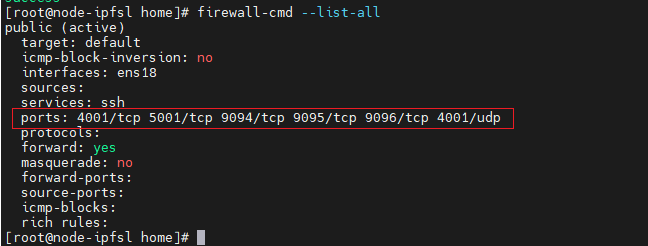
7. Installation Kubo (go-ipfs) – IPFS (3 machines)
- https://dist.ipfs.tech/kubo/v0.35.0/
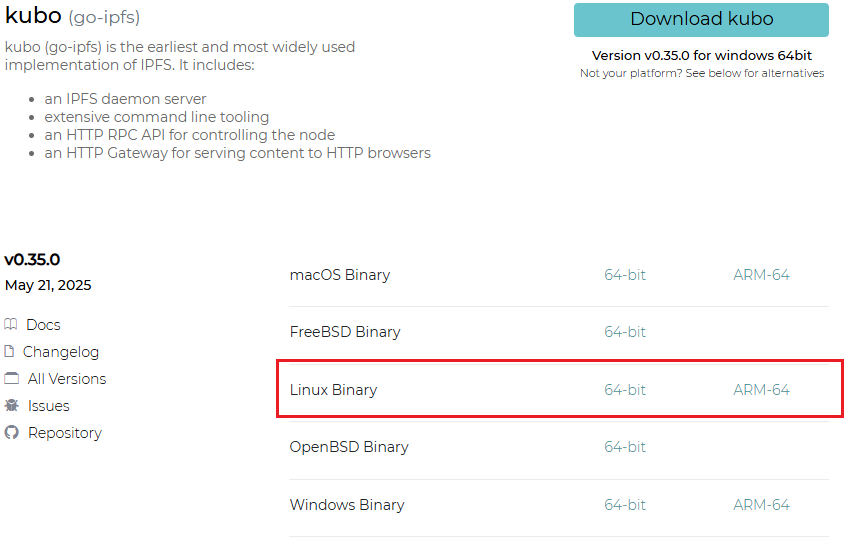
[root@node-ipfsx ~]# cd /home [root@node-ipfsx home]# wget https://dist.ipfs.tech/kubo/v0.35.0/kubo_v0.35.0_linux-amd64.tar.gz [root@node-ipfsx home]# tar -xzvf kubo_v0.35.0_linux-amd64.tar.gz kubo/

[root@node-ipfsx home]# cd kubo && bash install.sh && cd .. [root@node-ipfsx home]# ipfs --version ipfs version 0.35.0
8. Installation Cluster IPFS (3 machines)
Installation paquet Cluster service
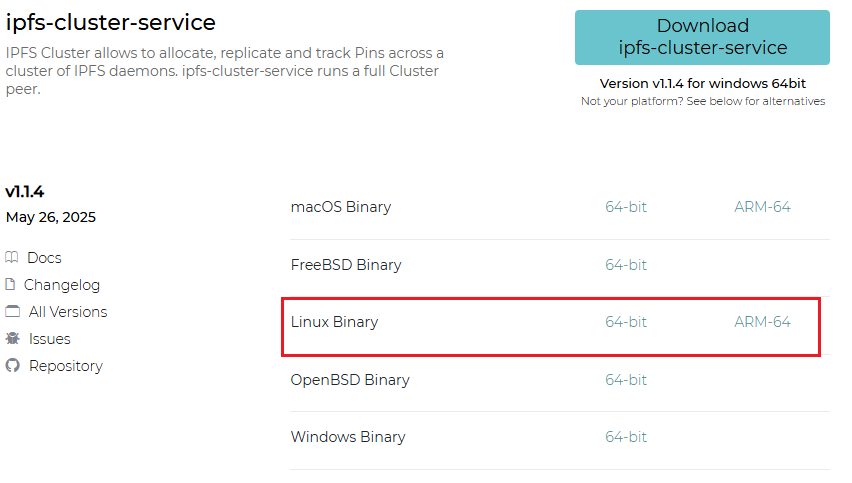
[root@node-ipfsx home]# cd /home && wget https://dist.ipfs.tech/ipfs-cluster-service/v1.1.4/ipfs-cluster-service_v1.1.4_linux-amd64.tar.gz [root@node-ipfsx home]# tar -xzvf ipfs-cluster-service_v1.1.4_linux-amd64.tar.gz ipfs-cluster-service/ [root@node-ipfsx home]# mv ipfs-cluster-service/ipfs-cluster-service /usr/local/bin/ [root@node-ipfsx home]# ipfs-cluster-service --version ipfs-cluster-service version 1.1.4
Installation paquet Cluster ctl
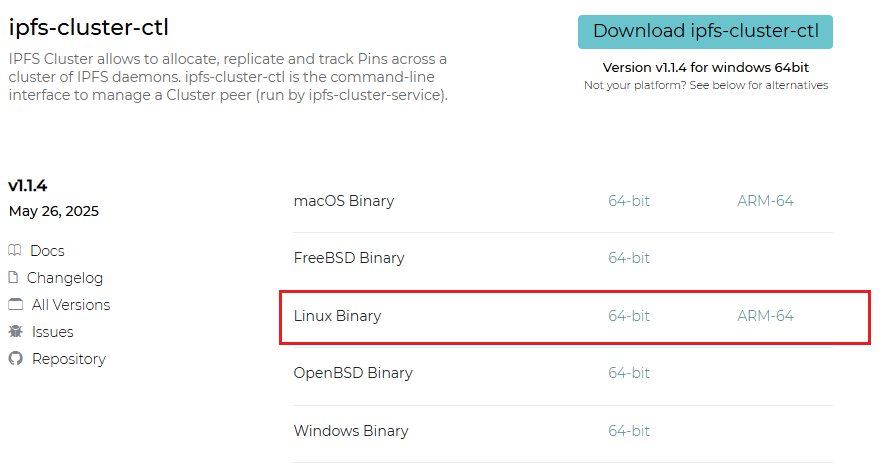
[root@node-ipfsx home]# cd /home && wget https://dist.ipfs.tech/ipfs-cluster-ctl/v1.1.4/ipfs-cluster-ctl_v1.1.4_linux-amd64.tar.gz [root@node-ipfsx home]# tar -xzvf ipfs-cluster-ctl_v1.1.4_linux-amd64.tar.gz ipfs-cluster-ctl/ [root@node-ipfsx home]# mv ipfs-cluster-ctl/ipfs-cluster-ctl /usr/local/bin/ [root@node-ipfsx home]# ipfs-cluster-ctl --version ipfs-cluster-ctl version 1.1.4
9. Initialisation et Service IPFS (go-ipfs) (3 machines)
Définition variable IPFS fichier configuration
[root@node-ipfsx home]# export IPFS_PATH=/mnt/ipfs-data/ipfs [root@node-ipfsx home]# vi $HOME/.bashrc

[root@node-ipfsx home]# source $HOME/.bashrc [root@node-ipfsx home]# echo $IPFS_PATH /mnt/ipfs-data/ipfs
10. Initialisation ipfs des 3 machines
Initialisation & réglages Système Node-ipfsl (leader)
Initialisation ipfs
[root@node-ipfsl home]# ipfs init generating ED25519 keypair...done peer identity: 12D3KooWCWwgEQx51YWB54Fn82JVQJ1SNm52sTHmNtQQAvMr6yza initializing IPFS node at /mnt/ipfs-data/ipfs
Réglage système
[root@node-ipfsl home]# ipfs config --json Datastore.StorageMax '"40GB"' [root@node-ipfsl home]# ipfs config Addresses.API /ip4/0.0.0.0/tcp/5001 [root@node-ipfsl home]# ipfs config --json API.HTTPHeaders.Access-Control-Allow-Origin '["*"]' [root@node-ipfsl home]# ipfs config --json API.HTTPHeaders.Access-Control-Allow-Methods '["PUT", "POST"]' [root@node-ipfsl home]# ipfs config --json API.HTTPHeaders.Access-Control-Allow-Origin '["http://192.168.1.70:5001", "http://localhost:3000", "http://127.0.0.1:5001", "https://node-ipfsl.house.cp"]'
Initialisation Node-ipfsp1& réglages Système (peer n°1)
Initialisation ipfs
[root@node-ipfsp1 home]# ipfs init generating ED25519 keypair...done peer identity: 12D3KooWJb4HwVbXFuxZSeFAUjocurt7gPw14G6CsZRwTpVgMNdP initializing IPFS node at /mnt/ipfs-data/ipfs
Réglage système
[root@node-ipfsp1 home]# ipfs config --json Datastore.StorageMax '"40GB"' [root@node-ipfsp1 home]# ipfs config Addresses.API /ip4/0.0.0.0/tcp/5001 [root@node-ipfsp1 home]# ipfs config --json API.HTTPHeaders.Access-Control-Allow-Origin '["*"]' [root@node-ipfsp1 home]# ipfs config --json API.HTTPHeaders.Access-Control-Allow-Methods '["PUT", "POST"]' [root@node-ipfsl home]# ipfs config --json API.HTTPHeaders.Access-Control-Allow-Origin '["http://192.168.1.71:5001", "http://localhost:3000", "http://127.0.0.1:5001", "https://node-ipfsp1.house.cp"]'
Initialisation Node-ipfsp1 & réglages Système (peer n°2)
Initialisation ipfs
[root@node-ipfsp2 home]# ipfs init generating ED25519 keypair...done peer identity: 12D3KooWQ4VuBLMjVvmW4F4fhKxbArFG4Y9SQ3coVBo1PL29qrJx initializing IPFS node at /mnt/ipfs-data/ipfs
Réglage système
[root@node-ipfsp2 home]# ipfs config --json Datastore.StorageMax '"40GB"' [root@node-ipfsp2 home]# ipfs config Addresses.API /ip4/0.0.0.0/tcp/5001 [root@node-ipfsp2 home]# ipfs config --json API.HTTPHeaders.Access-Control-Allow-Origin '["*"]' [root@node-ipfsp2 home]# ipfs config --json API.HTTPHeaders.Access-Control-Allow-Methods '["PUT", "POST"]' [root@node-ipfs2 home]# ipfs config --json API.HTTPHeaders.Access-Control-Allow-Origin '["http://192.168.1.72:5001", "http://localhost:3000", "http://127.0.0.1:5001", "https://node-ipfsp2.house.cp"]'
11. Configuration Service daemon ipfs (3 machines)
Création du service
[root@node-ipfsx home]# vi /etc/systemd/system/ipfs-peer.service [Unit] Description=IPFS Node (Pair – stockage RAID1) After=network.target [Service] User=root Environment="IPFS_PATH=/mnt/ipfs-data/ipfs" ExecStart=/usr/local/bin/ipfs daemon Restart=on-failure LimitNOFILE=10240 [Install] WantedBy=multi-user.target
Démarrage du service
[root@node-ipfsx home]# systemctl daemon-reexec [root@node-ipfsx home]# systemctl daemon-reload [root@node-ipfsx home]# systemctl enable ipfs-peer Created symlink /etc/systemd/system/multi-user.target.wants/ipfs-peer.service → /etc/systemd/system/ipfs-peer.service. [root@node-ipfsx home]# systemctl start ipfs-peer
Check du service Node-ipfsl (leader)
[root@node-ipfsl home]# systemctl status ipfs-peer

Check du service Node-ipfsp1 (peer n°1)
[root@node-ipfsp1 home]# systemctl status ipfs-peer

Check du service Node-ipfsp2 (peer n°2)
[root@node-ipfsp2 home]# systemctl status ipfs-peer
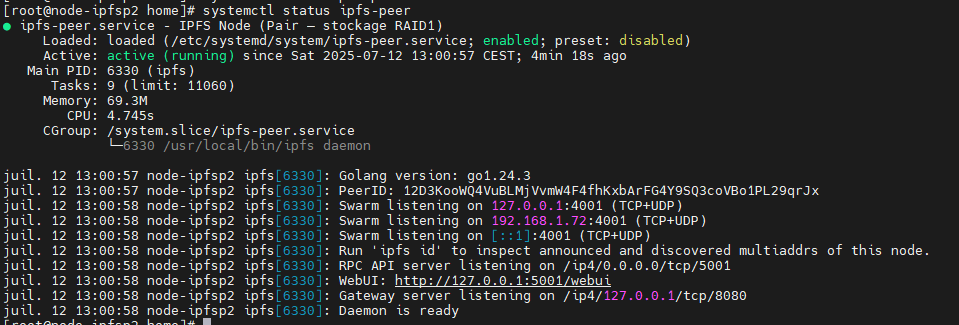
12. Initialisation et Service Cluster IPFS (3 machines)
Définition variable IPFS fichier configuration Cluster
[root@node-ipfsx home]# export IPFS_CLUSTER_PATH=/mnt/ipfs-data/ipfs-cluster [root@node-ipfsx home]# vi $HOME/.bashrc

[root@node-ipfsx home]# source $HOME/.bashrc [root@node-ipfsx home]# echo $IPFS_CLUSTER_PATH /mnt/ipfs-data/ipfs-cluster
Initialisation cluster
[root@node-ipfsx home]# ipfs-cluster-service init 2025-07-12T13:25:21.695+0200 INFO config config/config.go:482 Saving configuration configuration written to /mnt/ipfs-data/ipfs-cluster/service.json. 2025-07-12T13:25:21.697+0200 INFO config config/identity.go:73 Saving identity new identity written to /mnt/ipfs-data/ipfs-cluster/identity.json new empty peerstore written to /mnt/ipfs-data/ipfs-cluster/peerstore.
Node-ipfsl (leader)
Récupération la clef secrète du leader
[root@node-ipfsl home]# cat /mnt/ipfs-data/ipfs-cluster/service.json |grep -i secret "secret": "9dc28eb1c943ec508cc9f5a8b4c4726a5398be979c62521dd93252d62cb72196",
Injection de la clef secrète dans les peers client
Node-ipfsp1 (peer n°1)
[root@node-ipfsp1 home]# vi /mnt/ipfs-data/ipfs-cluster/service.json

Node-ipfsp2 (peer n°2)
[root@node-ipfsp2 home]# vi /mnt/ipfs-data/ipfs-cluster/service.json

Création des services Leader et peers
Service Node-ipfsl (leader)
[root@node-ipfsl home]# vi /etc/systemd/system/ipfs-cluster.service [Unit] Description=IPFS Cluster Service (RAID1) After=network.target [Service] User=root Group=root Environment=IPFS_CLUSTER_PATH=/mnt/ipfs-data/ipfs-cluster ExecStart=/usr/local/bin/ipfs-cluster-service daemon WorkingDirectory=/mnt/ipfs-data/ipfs-cluster Restart=always RestartSec=10 LimitNOFILE=10240 [Install] WantedBy=multi-user.target
Démarrage du service Cluster – leader
[root@node-ipfsl home]# systemctl daemon-reexec [root@node-ipfsl home]# systemctl daemon-reload [root@node-ipfsl home]# systemctl enable ipfs-cluster.service Created symlink /etc/systemd/system/multi-user.target.wants/ipfs-cluster.service → /etc/systemd/system/ipfs-cluster.service. .[root@node-ipfsl home]# systemctl start ipfs-cluster.service
[root@node-ipfsl home]# systemctl status ipfs-cluster.service

Récupération ID leader
[root@node-ipfsl home]# ipfs-cluster-ctl id |head -8 12D3KooWALCus4V2sFQmK8ZtLeSsBvxsE9GeUpdv4jJvwC3qPpAD | node-ipfsl | Sees 0 other peers > Addresses: - /ip4/127.0.0.1/tcp/9096/p2p/12D3KooWALCus4V2sFQmK8ZtLeSsBvxsE9GeUpdv4jJvwC3qPpAD - /ip4/192.168.1.70/tcp/9096/p2p/12D3KooWALCus4V2sFQmK8ZtLeSsBvxsE9GeUpdv4jJvwC3qPpAD
Services Node-ipfsp1 et Node-ipfsp2 (peers n°1 & 2)
Service cluster – peers
[root@node-ipfsp[1,2] home]# vi /etc/systemd/system/ipfs-cluster-peer.service [Unit] Description=IPFS Cluster Peer Service After=network.target [Service] User=root Group=root Environment=IPFS_CLUSTER_PATH=/mnt/ipfs-data/ipfs-cluster ExecStart=/usr/local/bin/ipfs-cluster-service daemon --bootstrap /ip4/192.168.1.70/tcp/9096/p2p/12D3KooWALCus4V2sFQmK8ZtLeSsBvxsE9GeUpdv4jJvwC3qPpAD WorkingDirectory=/mnt/ipfs-data/ipfs-cluster Restart=always RestartSec=10 LimitNOFILE=10240 [Install] WantedBy=multi-user.target
Démarrage du service Cluster – node-ipfsp1
[root@node-ipfsp1 home]# systemctl daemon-reexec [root@node-ipfsp1 home]# systemctl daemon-reload [root@node-ipfsp1 home]# systemctl enable ipfs-cluster-peer.service Created symlink /etc/systemd/system/multi-user.target.wants/ipfs-cluster-peer.service → /etc/systemd/system/ipfs-cluster-peer.service. [root@node-ipfsl home]# journalctl -f [root@node-ipfsp1 home]# systemctl start ipfs-cluster-peer.service
Check add Node-ipfsl
[root@node-ipfsl home]# systemctl status ipfs-cluster-peer.service

Sur le journal de log leader

[root@node-ipfsl home]# ipfs-cluster-ctl peers ls |grep 192

Démarrage du service Cluster – node-ipfsp2
[root@node-ipfsp2 home]# systemctl daemon-reexec [root@node-ipfsp2 home]# systemctl daemon-reload [root@node-ipfsp2 home]# systemctl enable ipfs-cluster-peer.service Created symlink /etc/systemd/system/multi-user.target.wants/ipfs-cluster-peer.service → /etc/systemd/system/ipfs-cluster-peer.service.
Check add Node-ipfsl
[root@node-ipfsl home]# journalctl -f [root@node-ipfsp2 home]# systemctl start ipfs-cluster-peer.service

Sur le journal de log leader

[root@node-ipfsl home]# ipfs-cluster-ctl peers ls |grep 192

13. Application Web API IPFS
- http://192.168.1.70:5001/webui

Cliquez sur « Pairs »
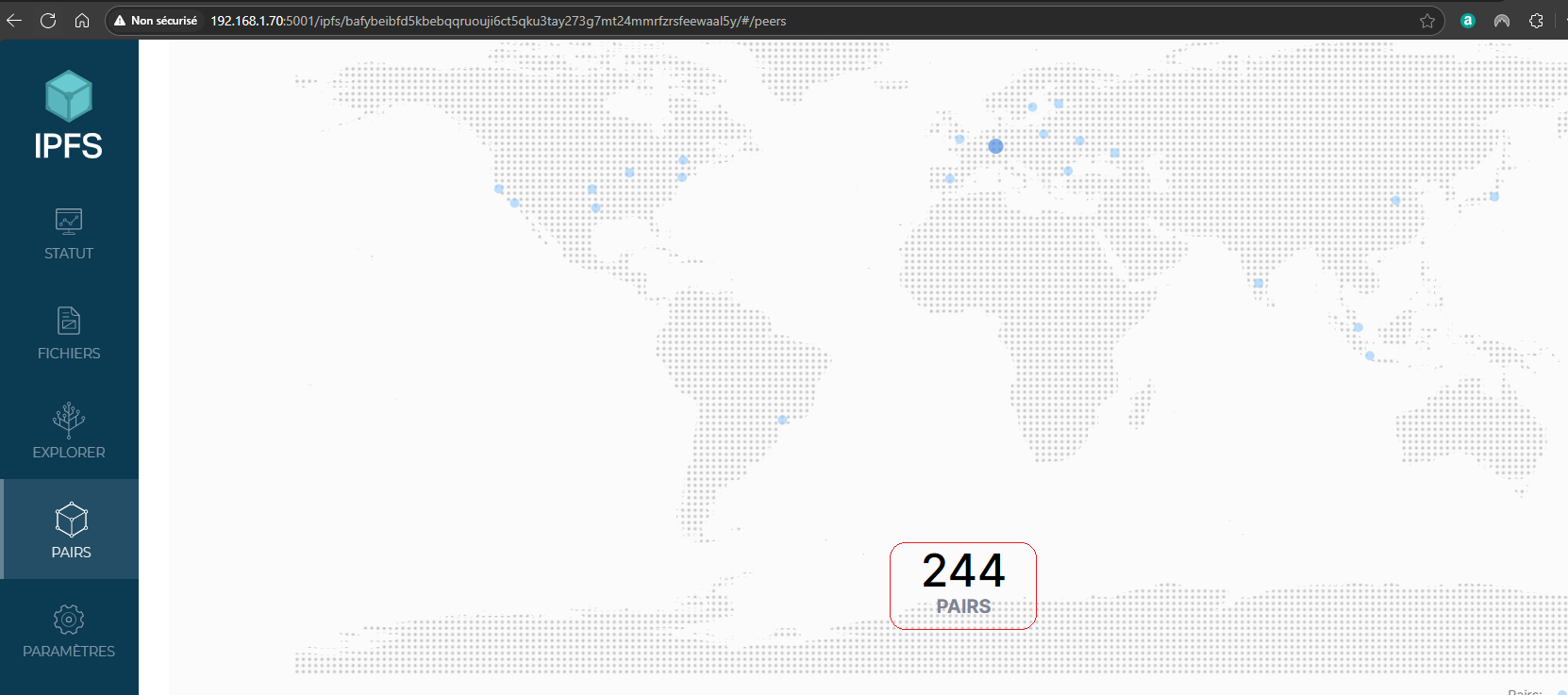
Notre Cluster et machines sont Public
Recherche nos machines sur le domaine public
Node-ipfsl (leader)
[root@node-ipfsl home]# ipfs id |grep -i ID |head -1 "ID": "12D3KooWCWwgEQx51YWB54Fn82JVQJ1SNm52sTHmNtQQAvMr6yza",

Node-ipfsp1 (peer n°1)
[root@node-ipfsp1 home]# ipfs id |grep -i ID |head -1 "ID": "12D3KooWJb4HwVbXFuxZSeFAUjocurt7gPw14G6CsZRwTpVgMNdP",

Node-ipfsp1 (peer n°2)
[root@node-ipfsp2 home]# ipfs id |grep -i ID |head -1 "ID": "12D3KooWQ4VuBLMjVvmW4F4fhKxbArFG4Y9SQ3coVBo1PL29qrJx",

Views: 11

